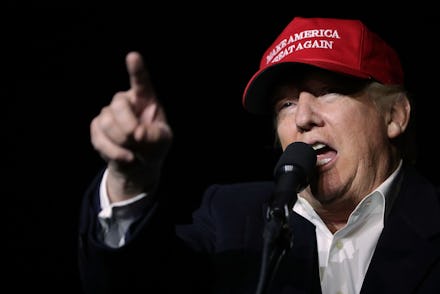Is voter fraud real or a myth? Here are the actual statistics.

The election is not rigged, no matter how many times Republican nominee Donald Trump says it is. While the candidate has prematurely blamed his possible loss on a number of factors — from the media to Hillary Clinton to election officials fixing the results — voter fraud is largely a myth. It almost never happens.
What is voter fraud?
Voter fraud comes in many forms, all of which involve an effort to interfere with the outcome of an election. Fraudulent voters might cast two ballots in one election, whether by impersonating someone at the polls or by registering multiple times under false names, or by posing as a deceased person.
Voter fraud can also occur when candidates or their minions attempt to buy votes, or when election officials manipulate the votes cast. An attempt to keep a group of people from voting is also considered voter fraud.
That last point is interesting, given that voter ID laws — which GOP proponents will argue exist to prevent people from voting twice — appear to have a disproportionately negative effect on people of color. Take Texas, for example: In July, a federal court ruled that the state's requirement that a voter produce one of seven forms of government-issued photo identification violated the 1965 Voting Rights Act. Many minorities either couldn't afford or couldn't obtain the requisite identification to vote, which left some 600,000 Texans who were eligible to cast their ballots unable to do so.
In other states, like North Carolina, courts have ruled that voter ID laws purposefully discriminate against minority voters, keeping them away from the polls. So when Trump rails against voter fraud, it's odd, considering that voter ID laws are a tenet of his party's platform.
Is voter fraud a myth?
Even in the face of evidence that suggests otherwise, Trump persists with his claim that the Democrats are the main agents of voter fraud. In the 2016 election, however, efforts at infiltrating the ballot box have largely come from Trump supporters — or Trump himself.
Just last week, a band of merry internet trolls looking to Make America Great Again circulated false ads on Twitter encouraging Clinton supporters not to wait until Nov. 8 to cast their ballots, but to text their votes to a fake number where they would never be counted. If the election were rigged, it would seem that Trump supporters are the ones rigging it.
And yet the numbers indicate that voter fraud is incredibly rare. According to NBC, a News21 analysis of 2,068 instances of alleged fraud nationwide during the elections between 2000 and 2012 pinpointed just 10 cases of voter impersonation in a pool of about 146 million total voters.
In 2007, the New York Times published results of a five-year review of voter fraud allegations. It found "virtually no evidence of any organized effort to skew federal elections," noting that while about 120 people had been charged with voter fraud, only 86 had been convicted. Further, many of those convictions appeared to result from legitimate mistakes — such as improperly completed paperwork — either on the part of the voter or election officials, rather than concerted efforts to game the system.
Justin Levitt, a professor at Loyola Law School in Los Angeles, tracked voter fraud for many years. In a 2014 Washington Post article, Levitt wrote that he'd pinpointed 31 cases of voter fraud since 2000. He counted "general, primary, special and municipal elections," noting that general elections and primaries generated over 1 billion ballots in those 14 years. Based on Levitt's findings, the incidence of voter fraud is so low as to be negligible.
He's not the only one to come to that conclusion, either. The Washington Post has a fun interactive graphic that illustrates just how rare in-person voter fraud is. (The short answer: very.)
There seems to be another explanation for Trump's tantrums. According to Columbia University professor Lorraine C. Minnite, we can attribute the paranoia over voter fraud, at least in part, to "unsubstantiated or false claims by the loser of a close race."
And indeed, it seems unlikely that Trump would continue to rant about voter fraud if he enjoyed a comfortable lead. Unfortunately for him, he doesn't.